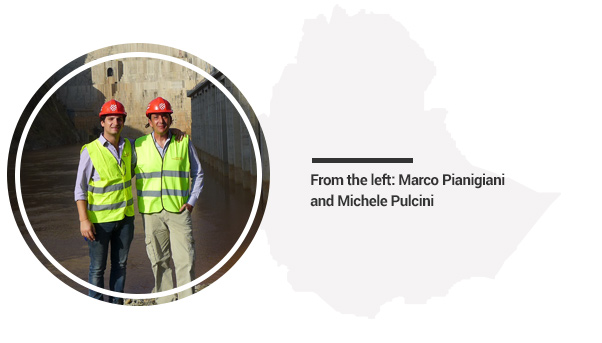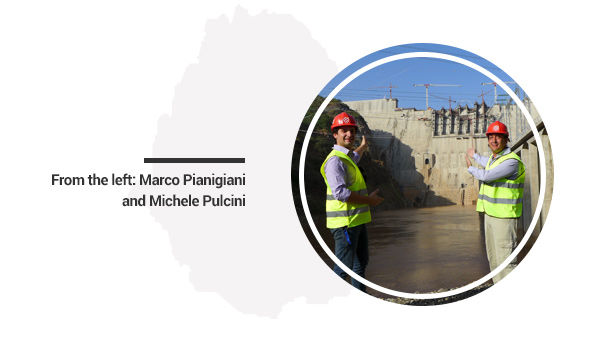On Christmas Eve at High Land, the camp where the men and women who are working to complete Gibe III (one of the biggest dams in Africa that will generate 6,500 GWh a year when it becomes operational) have their living quarters, there is often the sight of a sleigh being drawn by four donkeys dressed up as reindeers and led by Santa Claus, bringing gifts to the children at the construction site.
We are in the heart of Ethiopia, some 300 kilometres from the capital of Addis Ababa. It is a country with no access to the sea, as emphasized by Marco Pianigiani, a technical engineer: “We have to go to Djibouti to get the fish that we eat on Christmas Eve.”
There is no doubt of the difficulties, and the weather does not lend itself to the holiday season (temperatures can reach a high of 35-40 degrees Celsius). Notwithstanding these adverse conditions, Christmas is a time for celebration for everyone regardless of tradition. “A few days before (Christmas), we start decorating the trees in the canteen and the offices and throughout the camp. We organize ourselves for the evening of December 24.”

A big meal is a must: all the workers take part, celebrating the 40 nationalities that are present at the site with a variety of food that everyone can enjoy. It ranges from fish from the Italians to vegetables from the Indians. “Chilean, Pakistani, Indian, Chinese, Romanian, French, English, Cuban, Moroccan, Egyptian, Vietnamese...” Marco Pianigiani reads off a long list as if he sees a face with each nationality. “Everyone takes part in the meal,” he says. “It’s independent of the country of origin because, for this event, religion isn’t important for any of us but rather the event itself, this opportunity to be together.
The site manager is usually the one who organizes it. He is the one who looks after the food, organizes the menu and gets gifts for the children.” And then there’s the time for Santa Claus, who’s chosen following a rigorous physical selection process by Michele Pulcini, head of security. “We always choose a worker who is big and robust and with a beard. This year there are a number of candidates but we haven’t found a winner yet.” While waiting for Santa Claus, who appears on December 24 riding a sleigh to the High Land camp, families get together to take preparations into full swing.
“I’ve been working in Ethiopia for seven years and a half,” says Pulcini. “My family has lived here with me up until a few months ago when my third child was born. For my daughters, who went to a school set up by the Salini Impregilo Group at the site, living the Christmas festivities in the camp has been a unique experience, sharing it with children from all over the world with whom they were able to begin a dialogue and a meaningful exchange. The same thing happens with the adults: my wife’s best friend is Ecuadorean.”

Everyone takes part in the celebrations. “We eat at around 8:00 (p.m.) in the evening,” says Pianigiani, who has an Ethiopian wife. “Towards 10:30 (p.m.) we give out the gifts to the children and we end it all by doing a toast in the open air before we all go to bed.”
A youthful atmosphere is created and those who can invite their families to come share the holiday season with them at the site.
“This has led to some fantastic situations,” says Pulcini. “Young and old singing Christmas songs together, bringing joy and warmth even to our colleagues who are celebrating the holidays away from their families.
The attention that the site’s managers and the (Salini Impregilo) Group give to the well-being of the people who work here is something special,” he says. “It helps us to overcome any division, giving us strength and energy. We’re all brothers, here. We work shoulder to shoulder for months and this harmony becomes even stronger and palpable come Christmas. This year will be different for my family: the birth of my third child obliges us to celebrate the holidays in Italy. And my daughters are already complaining because they want at all cost to pass Christmas at Gibe III.”


